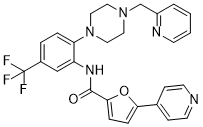All AbMole products are for research use only, cannot be used for human consumption.

SPHINX31 is a potent inhibitor of serine/arginine-rich protein kinase 1 (SRPK1) with IC50 of 5.9 nM. SPHINX31 inhibits phosphorylation of serine/arginine-rich splicing factor 1 (SRSF1). SPHINX31 treatment results in inhibition of SRSF1 phosphorylation at 300 nM in PC3 prostate cancer cells. Metabolic stability in mouse liver microsomes shows that SPHINX31 had medium clearance with a T1/2 of 95.79 min.
In vivo, SPHINX31 exerts a dose dependent inhibition of choroidal neovascularisation in mouse model. SPHINX31 inhibits blood vessel growth and macrophage infiltration. SPHINX31 treatment prolongs survival of immunocompromised mice transplanted with MLL-rearranged AML cells.
| Cell Experiment | |
|---|---|
| Cell lines | THP-1 cells |
| Preparation method | For synergy studies between SPHINX31 and iBET, THP-1 cells were seeded in 96-well plates at 10,000 cells per well and treated with SPHINX31 (dose range of 0.039–5 μM) and iBET (dose range of 9.8–312.5 nM) in an 8 by 6 matrix. Each treatment was carried out in triplicate. Cells were treated for 72 h, and cell viability was determined using CellTiter 96 AQueous Non-Radioactive Cell Proliferation Assay (Promega) in order to calculate the relative cell proliferation. Cell viability for each treatment was normalized against the DMSO control group. A Bliss independence model was employed to evaluate combination effects and calculate the Bliss independence score. All the compounds were dissolved in DMSO. |
| Concentrations | 0.039-5 μM |
| Incubation time | 72 h |
| Animal Experiment | |
|---|---|
| Animal models | DBA2J mice |
| Formulation | dissolved in 20%(w/v) 2-hydroxyproply beta-cyclodextrin vehicle |
| Dosages | 0.8 mg/kg |
| Administration | i.p. |
| Molecular Weight | 507.51 |
| Formula | C27H24F3N5O2 |
| CAS Number | 1818389-84-2 |
| Solubility (25°C) | DMSO 18 mg/mL |
| Storage |
Powder -20°C 3 years ; 4°C 2 years In solvent -80°C 6 months ; -20°C 1 month |
| Related SRPK Products |
|---|
| MSC-1186
MSC-1186 is a highly selective pan-SRPK inhibitor with activity against SRPK1, SRPK2, and SRPK3 with IC50 values of 2.7 nM, 81 nM, and 0.6 nM, respectively.MSC-1186 can be used in cancer research. |
| SRPKIN-1
SRPKIN-1 is a covalent and irreversible SRPK1/2 inhibitor with IC50s of 35.6 and 98 nM, respectively. Anti-angiogenesis effect. |
| WAY-652848
WAY-652848 is a selective inhibitor of SRPK1 with an IC50 value of 0.58 μM.WAY-652848 effectively reduces choroidal neovascularization (CNV) in vivo, and can be used in the study of age-related macular degeneration. |
| SRPIN340
SRPIN340 is a selective SRPK inhibitor with Ki of 0.89 μM for SRPK1, showing no significant inhibitory activity against more than 140 other kinases. |
All AbMole products are for research use only, cannot be used for human consumption or veterinary use. We do not provide products or services to individuals. Please comply with the intended use and do not use AbMole products for any other purpose.


Products are for research use only. Not for human use. We do not sell to patients.
© Copyright 2010-2024 AbMole BioScience. All Rights Reserved.
